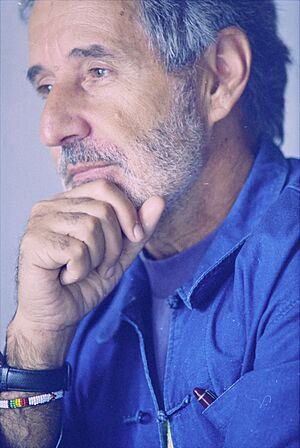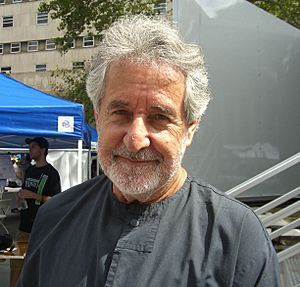Breyten Breytenbach facts for kids
Quick facts for kids
Breyten Breytenbach
|
|
|---|---|

Breytenbach in 1995
|
|
| Born | 16 September 1939 Bonnievale, Cape Province, South Africa |
| Died | 24 November 2024 (aged 85) Paris, France |
| Occupation | Novelist, essayist, poet, painter |
| Language | Afrikaans, English |
| Citizenship |
|
| Alma mater | University of Cape Town |
| Notable awards |
|
| Spouse | Yolande |
| Relatives | Jan Breytenbach (brother) Cloete Breytenbach (brother) |
Breyten Breytenbach ( 16 September 1939 – 24 November 2024) was a South African writer, poet, and painter. He became internationally well-known as a dissident poet and vocal critic of South Africa under apartheid, and as a political prisoner of the National Party-led South African Government. He is also known as a founding member of the Sestigers, a dissident literary movement, and was one of the most important living poets in Afrikaans literature.
Contents
Early life and education
Breyten Breytenbach was born on 16 September 1939 in Bonnievale, South Africa.
For secondary education, he attended Hoërskool Hugenote, in Wellington, Western Cape. He later attended the University of Cape Town, studying fine arts at the Michaelis School of Fine Art.
Activism and imprisonment
Breytenbach was a political dissenter against the ruling National Party and its white supremacist policy of apartheid in the early 1960s. He was a founding member of the dissident literary movement of Afrikaner writers, the Sestigers in 1961.
He left South Africa for Paris, France, where he married a French woman of Vietnamese ancestry, Yolande, as a result of which he was not allowed to return. The then applicable Prohibition of Mixed Marriages Act of 1949 and Immorality Act (1950) made it a criminal offence for a person to have any relations with a person of a different race. However, in 1973, a special visa was granted to the couple to allow them to travel to South Africa for a writers' congress at the University of Cape Town.
After travelling to South Africa in 1975 on a false passport, he was arrested. At his trial at the Supreme Court in Pretoria after being charged under the Terrorism Act 1967, he pleaded guilty to entering South Africa to start an organisation called Atlas or Okhela, which was intended to be a branch of the African National Congress (ANC) for white people. He sentenced to nine years' imprisonment for high treason, of which he served seven. His memoir The True Confessions of an Albino Terrorist, published in 1984, describes aspects of his imprisonment. According to André Brink, Breytenbach was retried in June 1977 on new and fanciful charges that, among other things, he had planned a submarine attack by the Soviet Navy on the Robben Island prison through the Okhela. In the end, the judge found him guilty only of having smuggled letters and poems out of jail for which he was fined $50.
Released in 1982 as a result of international protests, Breytenbach returned to Paris, where he remained for the rest of his life, after obtaining French citizenship. In December 1993, he paid a visit to the "new South Africa", and continued to travel there regularly, as well as spending time in the United States and Europe.
After free elections toppled the ruling National Party and ended apartheid in 1994, Breytenbach became a visiting professor at the University of Cape Town in the Graduate School of Humanities in January 2000.
He was a foundation member, former executive director, later board member (at least until his 80th birthday) of the Gorée Institute in Dakar, Senegal. This arose from an historic meeting in 1987 that became known as the Dakar Conference, between exiled leaders of the ANC and a group of liberal South Africans, mostly Afrikaners, from all walks of life. This gathering, held to define a strategy for effective struggle against the apartheid regime, was one of many that opened the way for a negotiated end to apartheid in South Africa. A good friend of Breytenbach, Frederik van Zyl Slabbert, also attended. Breytenbach later taught classes at the institute.
Writing
Breytenbach has written poetry, novels, plays, and essays, mostly in Afrikaans. Many of his works have been translated into multiple languages.
His first published work was Die Ysterkoei Moet Sweet ("The Iron Cow Must Sweat") in 1964. It was regarded as groundbreaking in Afrikaans poetry, presenting "powerful and startling ideas... without the use of traditional rhythmic metres and attractive images".
During his imprisonment, Breytenbach wrote five volumes of poetry and English prose. His prison writings included the poem "Ballade van ontroue bemindes" ("Ballade of Unfaithful Lovers"). Inspired by François Villon's 15th-century "Ballade des Dames du Temps Jadis", Breytenbach compared Afrikaner dissidents Peter Blum, Ingrid Jonker, and himself to unfaithful lovers, who had betrayed Afrikaans poetry by taking leave of it.
In 1984, he published his prison memoir The True Confessions of an Albino Terrorist.
Art
Breytenbach is also known for his paintings, which have been exhibited internationally in Paris, Amsterdam, New York City, Stockholm, and Hong Kong. The works are often surreal in nature, featuring animal and human figures in captivity.
In October to November 2018, a solo exhibition of his recent work, along with some older works, entitled The 81 ways of letting go a late self, was held at the Stevenson Gallery in Cape Town.
Academia
In January 2000 Breytenbach started a three-year stint as visiting professor in the departments of English and Drama in the Graduate School of Humanities at the University of Cape Town.
He also taught at the University of Natal, Princeton University, and in the Graduate Creative Writing Program at New York University, as "global professor".
Personal life, death, and legacy
From 1962 until his death in 2024, Breytenbach was married to Yolande Ngo Thi Hoang Lien, who was born in Vietnam and raised in France, carrying Vietnamese citizenship. They had a daughter, Daphnée, and two grandsons. He also held French citizenship.
Breytenbach died in Paris, France on 24 November 2024, at the age of 85. His wife Yolande was by his side.
He was the younger brother of Jan Breytenbach (1932 – 16 June 2024), an SADF commander against whom he held strongly opposing political views, and the late Cloete Breytenbach (1933–2019) a widely published war correspondent. Cloete was notably one of the few people who was being given permission by South African Prime Minister John Vorster to take photographs of Nelson Mandela at Robben Island following his imprisonment there in July 1964. Jan had died only five months before Breyten in June 2024.
Breytenbach is now informally considered by Afrikaans-speakers as their poet laureate and was one of the most important living poets in Afrikaans literature.
Honours and awards
French honours
- Chevalier de la Legion d'Honneur
- Commandeur des Arts et Lettres (France's top cultural award)
Literary awards
- CNA Award (5 times), for Die huis van die dowe (1968), Kouevuur (1969), Lotus (1970), YK (1983), and Memory of snow and dust (1989)
- 1965: APB Prize for Die ysterkoei moet sweet and Katastrofes
- 1968: Reina Prinsen Geerligs Award for South Africa, for Die huis van die dowe
- 1972: Lucy B. and C.W. van der Hoogt Prize, for Lotus
- 1984, 1999, 2008, & 2010: Hertzog Prize He refused to accept the 1984 prize (for Yk).
- 1982: Van der Hoogt Prize for Skryt
- 1985: Anisfield-Wolf Book Award for Fiction, for Mouroir: Mirrornotes of a Novel
- 1986: Rapport Literature Prize, worth R 15,000 (a major prize)
- 1994: Alan Paton Award, for Return to Paradise
- 2007: University of Johannesburg Prize for Creative Writing, for "Die windvanger"
- 2007: W.A. Hofmeyr Prize, for "Die windvanger"
- 2007: Hertzog Prize, for "Die windvanger"
- 2010: Mahmoud Darwish Award for Creativity, for Outre Voix/Voice Over, the French translation of Oorblyfsel/Voice Over: 'n roudig
- 2010: Max Jacob Prize, for Outre Voix/Voice Over
- 2017: Zbigniew Herbert International Literary Award
- Jan Campert Prize, special prize
- Jacobus van Looy Prize (for literature and art)
- Perskor Prize, for Voetskrif
- International Publishers Prize, special prize
Works
Breytenbach's work includes numerous volumes of novels, poetry and essays, many of which are in Afrikaans. Many have been translated from Afrikaans to English, and many were originally published in English. He is also known for his works of pictorial arts. Exhibitions of his paintings and prints have been shown in cities around the world.
His works have been translated into many languages, including English, Dutch, German, French, Arabic, Polish, Danish, Basque, Swedish, Portuguese, Spanish, and Italian.
Poetry in Afrikaans
- The Iron Cow Must Sweat (Die ysterkoei moet sweet), Johannesburg, 1964
- The House of the Deaf (Die huis van die dowe), Cape Town, 1967
- Gangrene (Kouevuur), Cape Town, 1969
- Lotus, Cape Town, 1970
- The Remains (Oorblyfsels), Cape Town, 1970
- Scrit. Painting Blue a sinking Ship. (Skryt. Om 'n sinkende skip blou te verf), Amsterdam, 1972
- In Other Words (Met ander woorde), Cape Town, 1973
- Footnote (Voetskrif), Johannesburg, 1976
- Sinking Ship Blues, Oasis Editions, Toronto 1977
- And Death White as Words. An Anthology, London, 1978
- In Africa even the flies are happy, London, 1978
- Flower Writing (Blomskryf), Emmarentia, 1979 (Selected poems)
- Eclipse (Eklips), Emmarentia, 1983
- YK, Emmarentia, 1983
- Buffalo Bill, Emmarentia, 1984
- Living Death (Lewendood), Emmarentia, 1985
- Judas Eye, London – New York, 1988
- As Like (Soos die so), Emmarentia, 1990
- Nine Landscapes of our Times Bequeathed to a Beloved (Nege landskappe van ons tye bemaak aan 'n beminde), Groenkloof, 1993
- The Handful of Feathers (Die hand vol vere), Cape Town, 1995 (Selected poems)
- The Remains. An Elegy (Oorblyfsels. 'n Roudig), Cape Town, 1997
- Paper Flower (Papierblom), Cape Town, 1998
- Lady One, Cape Town, 2000 (Selected love poems)
- Iron Cow Blues (Ysterkoei-blues), Cape Town, 2001 (Collected poems 1964–1975)
- Lady One: Of Love and other Poems, New York, 2002
- The undanced dance. Prison poetry 1975 – 1983 (Die ongedanste dans. Gevangenisgedigte 1975 – 1983), Cape Town, 2005
- the windcatcher (Die windvanger), Cape Town, 2007
- Voice Over: A Nomadic Conversation with Mahmoud Darwish, Archipelago Books, 2009
- Catalects (Artefacts for the slow uses of dying) (Katalekte (artefakte vir die stadige gebruike van doodgaan)), Cape Town: Human & Rousseau, 2012
Prose in English
- Catastrophes (Katastrofes), Johannesburg, 1964 (stories)
- To Fly (Om te vlieg), Cape Town, 1971 (novel)
- The Tree Behind the Moon (De boom achter de maan), Amsterdam, 1974 (stories)
- The Anthill Bloats … (Die miernes swell op ...), Emmarentia, 1980 (stories)
- A Season in Paradise (Een seizoen in het paradijs), Amsterdam – New York – London, 1980 (novel, uncensored edition)
- Mouroir: Mirror Notes of a Novel, London – New York, 1983
- Mirror Death (Spiegeldood), Amsterdam, 1984 (stories)
- End Papers, London, 1985 (essays)
- The True Confessions of an Albino Terrorist, London – New York, 1985
- Memory of Snow and of Dust, London – New York, 1987 (novel)
- Book. Part One (Boek. Deel een), Emmarentia, 1987 (essays)
- All One Horse. Fiction and Images, London, 1989
- Sweet Heart (Hart-Lam), Emmarentia, 1991 (essays)
- Return to Paradise. An African journal, London – New York, 1992 (which won the Alan Paton Award)
- The Memory of Birds in Times of Revolution, London – New York, 1996 (essays)
- Dog Heart. A travel memoir, Cape Town, 1998
- Word Work (Woordwerk), Cape Town, 1999
- A veil of footsteps, Cape Town, 2008
- All One Horse, Archipelago Books, 2008
- Mouroir: Mirror Notes of a Novel, Archiepalago Books, 2008
- Intimate Stranger, Archipelago Books, 2009
- Notes From The Middle World: Essays, Haymarket Books, 2009
CDs
- Mondmusiek (2001)
- Lady One (2002)
See also
 In Spanish: Breyten Breytenbach para niños
In Spanish: Breyten Breytenbach para niños
- Sestigers
- Zbigniew Herbert International Literary Award


